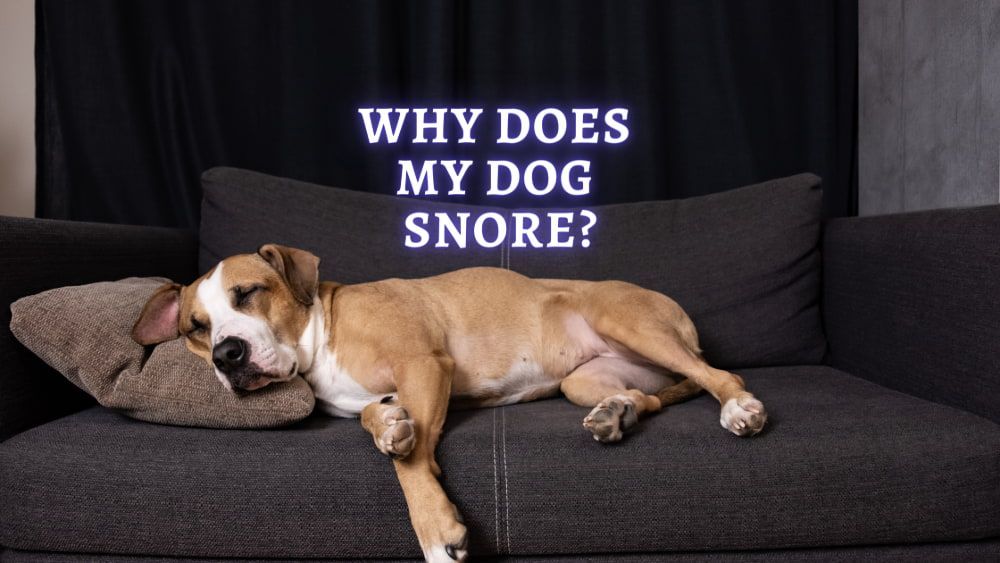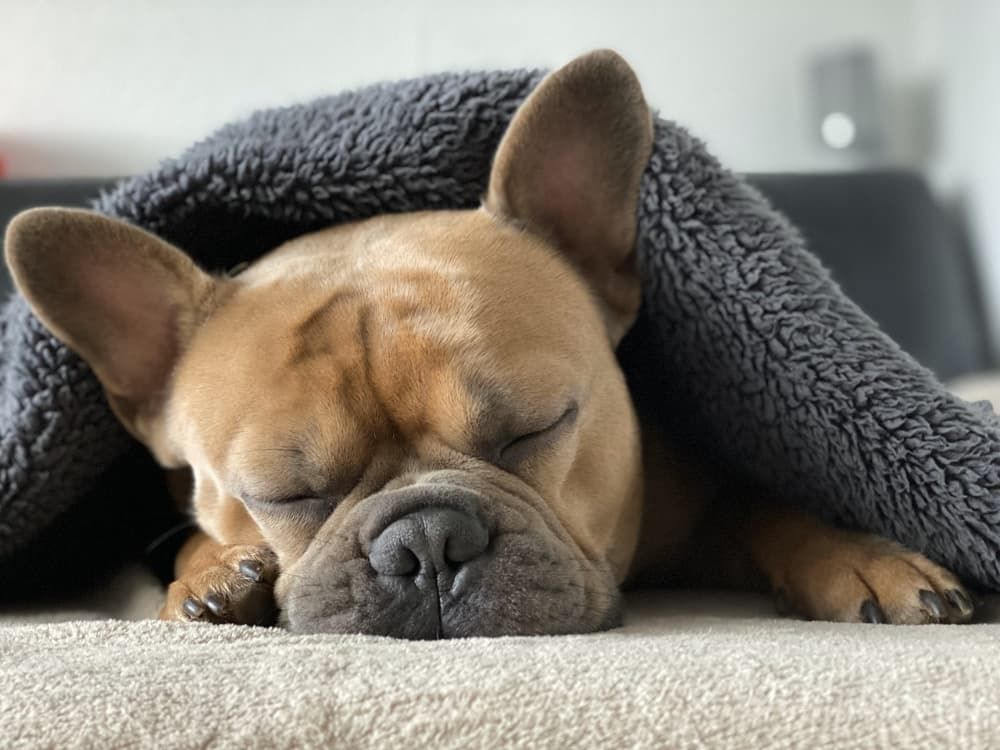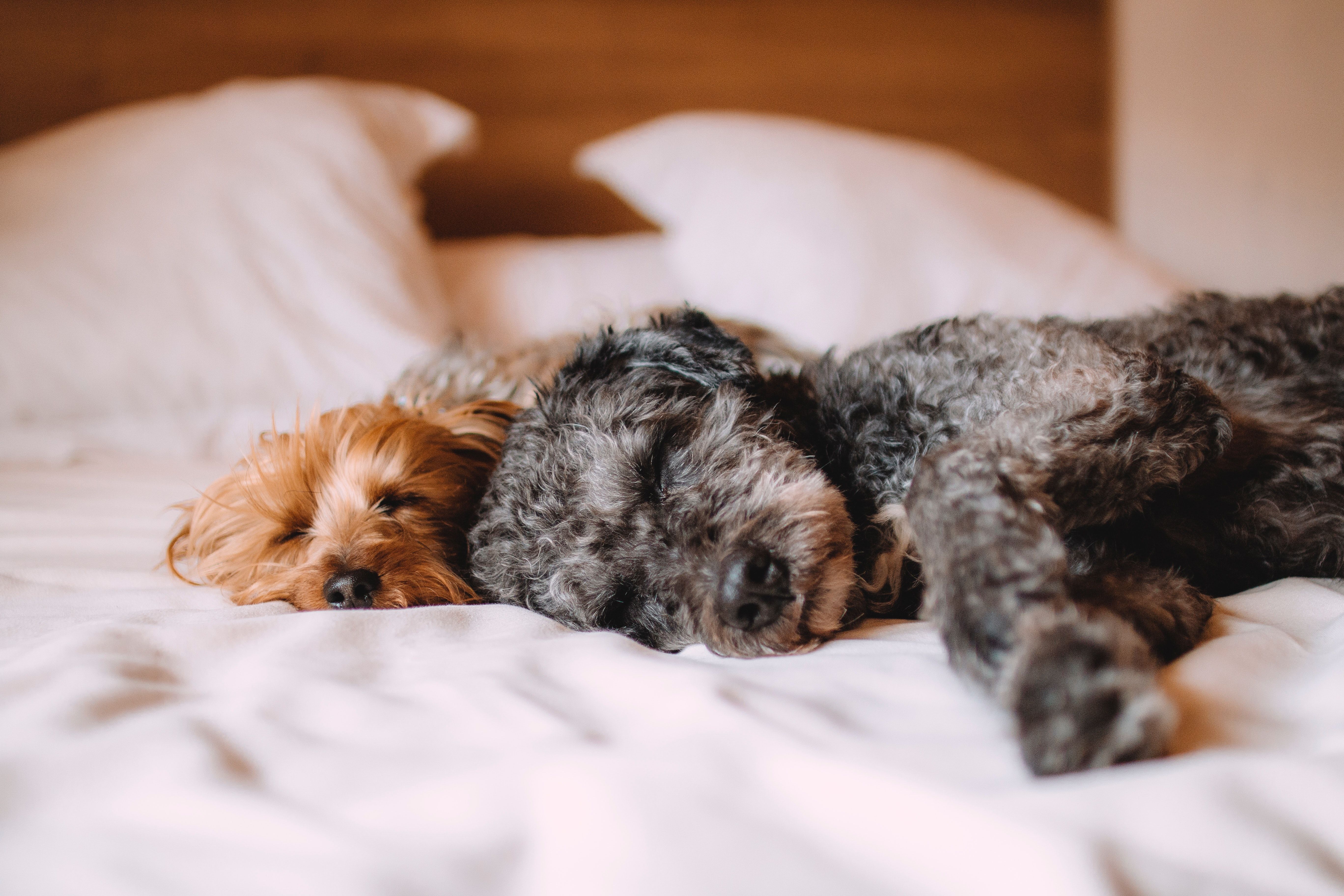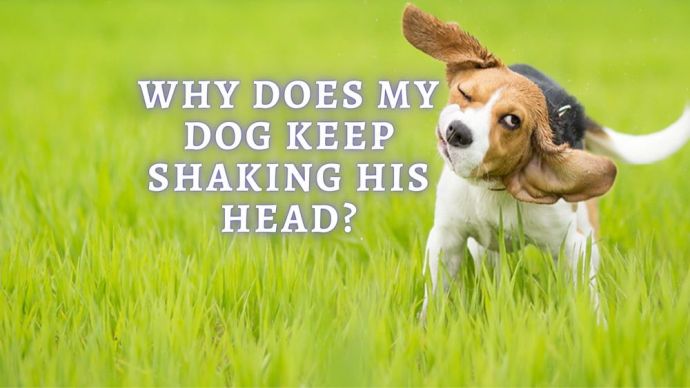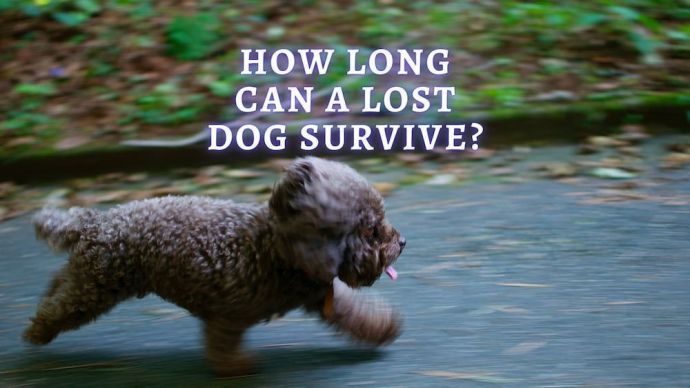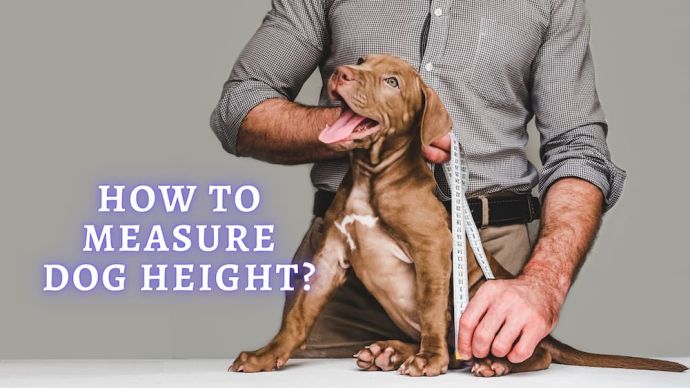Why Does My Dog Snore: 10 Reasons for Your Dog Snoring
Written by:
Author: Alina Andreeva
Alina A. is a professional writer, editor, and pet-lover. She has published over 50 articles on how to care for pets properly. Alina has been writing articles for 3 years, so she has considerable experience in this niche. Her natural curiosity helps her to expand her knowledge and learn new pet care life hacks, which will make your life much easier.
View all 79 articlesLearn about our editorial process and veterinary review board.
Reviewed by:
Veterinary review
by Dr. Sara Ochoa
Dr. Sara Redding Ochoa is a veterinarian with many years of experience and higher education. During her time in veterinary school she was able to learn form some of the most well-known veterinarians from all over the world. Sara lives happily with her husband Greg and her babies Ruby the schnoodle, and Bam-Bam her bunny. Dr. Sara Redding Ochoa has a passion and love for animals that makes her a wonderful asset to our team.
View all 13 articlesLearn about our veterinary review board
Viewed: 143
Updated on: 07/01/2021
You switch off the lights and make yourself comfortable in bed, and suddenly, like a thunderstorm out of the blue, you hear a freight train-like noise coming from the corner of the room. Before you shake out your sleeping spouse of sleep for snoring, get a better look. It may well be your dog.
Like humans, canines sometimes snore. According to the Mayo Clinic Sleep Disorders enter, snoring was reported in 21 % of dogs. [1] While snoring can be normal in some dogs, it can also be an early sign something isn’t right.
Read More: My Puppy Shakes while Sleeping
Why Dogs Snore?
Snoring is different from just having a stuffy nose. With snoring, the soft palate or other pharyngeal tissues are caused to vibrate as inspired air is drawn through narrowed upper airways. [2]
Dr. McKiernan
This unusual air movement causes resistance. This is what creates those grunting and harsh noises. Some canines are more prone to snoring than others. Here are the most common causes of snoring in dogs:
- Breed anatomy
- Sleeping position
- Allergies
- Rhinitis
- Certain medications
- Obesity
- Obstruction in the airways
- Dental problems
- Secondhand smoke
- Aspergillosis
Let’s take a closer look at each of them.
1. Breed Anatomy
Certain breeds with short noses and flattened faces are more pre-disposed to snoring at night and breathing issues. They are known as ‘brachycephalic.’
They typically have enlarged soft palates, overly narrowed nostrils, and everted laryngeal saccules, meaning that tissue in the airway is pulled into and obstructs the airway. [2]
Dr. McKiernan
The physiology of brachycephalic dogs makes it more difficult for them to pant enough to cool off. Some breeds include:
- Shar-Pei;
- Bulldogs;
- Pekinese;
- Boxers;
- Chihuahuas;
- Shih Tzus;
- Pugs;
- Boston Terriers;
- Chow Chows. [3]
READ MORE: Best Dog Food for Shih Tzu
Although a pushed-in appearance is cute, it can cause brachycephalic airway syndrome. These dogs not just snore at night but may also faint during exercise or tire easily. Symptoms like these may be mild at first, but they can get worse over time. Brachycephalic dog parents “need to take reasonable precautions when exercising outdoors in hot weather,” says Link Newcomb, president of the Bulldog Club of America. [4] If you see your furry friend is short in breath and pants more than usually, he needs to cool off. You may still schedule a checkup with your veterinarian to make sure the condition does not require medical intervention.
2. Sleeping Position
If your pooch pal is one of those chilled out souls who like to sleep stretched out on their backs. Then he may also “pamper” you with frequent snoring sessions. An easy fix for this is changing your pup’s position. You can move your pet, laying him down on his side. You can also purchase a bed with a built-in small pillow to reduce the chance of him rolling over on his back.
3. Allergies
Dogs can acquire allergies to many of the things, including dust, pollen, perfume, or other physical allergens – all of which can lead to the inflammation and constriction of air passages. The allergy can cause the body to produce excess mucus, which may be the culprit of snoring. Also, your pup may exhibit such symptoms as sneezing, nasal discharge, or watery eyes. If your pet has a seasonal allergy to dust or pollen, keep him inside with an air conditioner. And when he comes out, wash his face and paws whenever he returns home.
4. Rhinitis
Canines can catch “colds” just like humans, and this can lead to nasal congestion. Your dog’s mucus membranes get irritated and inflamed. Rhinitis can result in symptoms that include sneezing, difficulty in breathing, stuffy and runny nose, and snoring. Veterinarians treat this disease with antibiotics. Humidifying the air can also help in creating a better breathing environment.
5. Medications
If your dog takes muscle relaxants because of injury, he may begin snoring as the muscles loosen up and press on the air passages. Simple pain killers may also lead to snoring in dogs. Sometimes canines will begin puffing on tranquilizers for the same reason as when on muscle relaxants. In this case, snoring is usually of no concern.
Read More: How to Give a Dog a Pill: Tips from a Vet
6. Obesity
According to the Association for Pet Obesity Prevention, 56% of dogs in the United States today are overweight or obese, meaning they weigh 15% or more above their ideal weight. [5] If your pet has gained extra pounds, the excess fat depositing in throat tissues can block air passages. Or the rings in his trachea may close during shut-eye. Also, the fat around your dog’s thoracic cage makes his respiratory system work harder each time he inhales air.
7. Obstruction in the Air Passages
Any time your canine friend sticks his nose in different places, something may end up getting stuck in his air passages. This concerning cause of snoring will most likely require veterinary intervention. Foreign objects can block normal breathing and cause turbulent airflow, triggering snoring or noisy breathing. These obstructions in the air passages can be anything from a part of a pine cone or part of his favorite toy, through polyps and abscesses, to the most serious: tumors of the palate, nose, or throat. The sooner these problems are discovered, the better for your dog’s health.
8. Dental Problems
A dental disease, sinus, tooth abscess, any growth in the mouth can be the root cause of snoring. If left untreated, the infection can spread your dog’s body and lead to much more severe health issues. Dental problems can be very painful. So if you think your pooch pal has any, schedule a visit with your dog’s veterinarian immediately.
9. Secondhand Smoke
According to the Kentucky Center for Smoke-free Policy, about one-fifth of pet parents are cigarette smokers. [6] Living in a home with a smoker puts companion animals at great risk of many health problems. Exposure to secondhand smoke may lead to eye infections, allergies, and respiratory diseases, including asthma, bronchitis, snoring, and even lung cancer.[7][8][9]
10. Fungal Disease
A fungal disease called aspergillosis can cause snoring in dogs. It begins when dogs inhale mold spores, usually obtained from cut grass, hay, straw, and dust. The fungus can penetrate the nose’s moist lining and trigger symptoms such as the runny and stuffy nose, sneezing, swelling, and snoring.[10] Untreated, aspergillosis can be quite serious, but it usually clears up after an antifungal treatment course.
Read More: Are Two Dogs Better That One?
FAQ
Is It Normal For Dogs to Snore?
For some breeds, snoring is normal and harmless. In other situations, this could be a sign of a health problem. The best thing is to talk to your veterinarian.
How do I get my dog to stop snoring?
First of all, you need to find out the possible causes of your pup’s snoring. For this, take him to the vet to diagnose the underlying problem. Again, if your dog has an allergy, clean bedding and frequent bathing might be enough to keep your furry friend from snoring.
If the problem lies in your dog’s sleeping position, there is a good solution – a circular dog bed. It will help your pooch pal to sleep in a natural curled up position to prevent snoring.
Finally, if your canine companion has a dry throat, he may produce those grunting noises during the shut-eye. An air purifier in the room he sleeps in will help relieve the dryness.
Why Does My Dog Sound Like Snoring?
A snoring sound occurs when there is some kind of blockage in the pup’s upper airways.
Article Sources:
- “Dog Tired? It Could Be Your Pooch.” ScienceDaily, 15 Feb. 2002, sciencedaily.com/releases/2002/02/020215070932.htm.
- Netherton, Sarah. “Why Does My Pet Snore? – Veterinary Medicine at Illinois.” University of Illinois College of Veterinary Medicine, 2 Feb. 2021, vetmed.illinois.edu/pet_column/pet-snore/.
- “Caring for Brachycephalic Dogs.” MSPCA-Angell, 6 June 2019, mspca.org/angell_services/caring-for-brachycephalic-dogs/.
- Gewirtz, Elaine. “Exercise for Brachycephalic Breeds: Workout Safety for Flat-Faced Dogs.” American Kennel Club, 20 Dec. 2019, akc.org/expert-advice/dog-breeds/sports-snouts-and-extreme-weather-workout-safety-for-flat-faced-dogs/.
- “Association for Pet Obesity Prevention.” Association for Pet Obesity Prevention, 6 Feb. 2021, petobesityprevention.org/.
- Roza, Marcello. “The Dog as a Passive Smoker: Effects of Exposure to Environmental Cigarette Smoke on Domestic Dogs – PubMed.” PubMed, 1 Nov. 2007, pubmed.ncbi.nlm.nih.gov/17978991/.
- “Be Smoke-Free and Help Your Pets Live Longer, Healthier Lives.” U.S. Food and Drug Administration, 16 Apr. 2019, fda.gov/animal-veterinary/animal-health-literacy/be-smoke-free-and-help-your-pets-live-longer-healthier-lives.
- Secondhand Smoke and Pets | BreatheCollege of Nursing-White. uky.edu/breathe/tobacco-policy/quick-facts-topic/secondhand-smoke/secondhand-smoke-and-pets.
- Stanley, Coren. “Are Dogs Who Live With Smokers At Risk of Getting Cancer?” American Kennel Club, 24 Oct. 2017, akc.org/expert-advice/health/dogs-who-live-with-smokers/.
- Williams, Krista. “Aspergillosis in Dogs.” VCA Hospitals, vcahospitals.com/know-your-pet/aspergillosis-in-dogs/
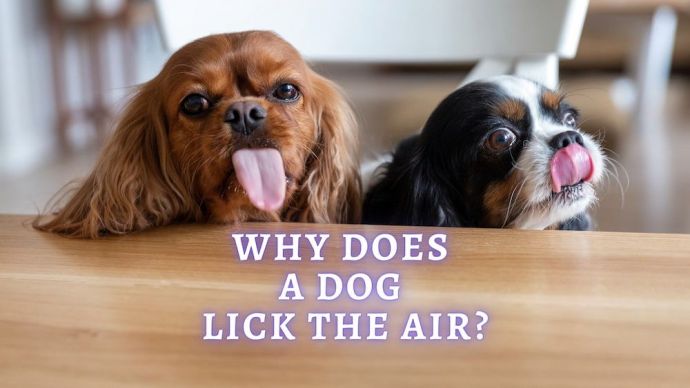 Dog Care Why Does My Dog Lick The Air? Health and Behavior Reasons for Dog Licking Air and How to Stop It
Dog Care Why Does My Dog Lick The Air? Health and Behavior Reasons for Dog Licking Air and How to Stop It - 117
- 0
 Dog Veterinary Tips Why is my Dog throwing up: Causes and Preventing (Veterinary Advice)
Dog Veterinary Tips Why is my Dog throwing up: Causes and Preventing (Veterinary Advice) - 21800
- 5
 Dog Care My Dog Keeps Scratching His Mouth: Reasons Why Your Dog Scratching Face
Dog Care My Dog Keeps Scratching His Mouth: Reasons Why Your Dog Scratching Face - 17168
- 1
 Dog Care Why Is My Dog Bleeding From Its Butt? Causes and treatment of rectal bleeding in the dog
Dog Care Why Is My Dog Bleeding From Its Butt? Causes and treatment of rectal bleeding in the dog - 15114
- 0









